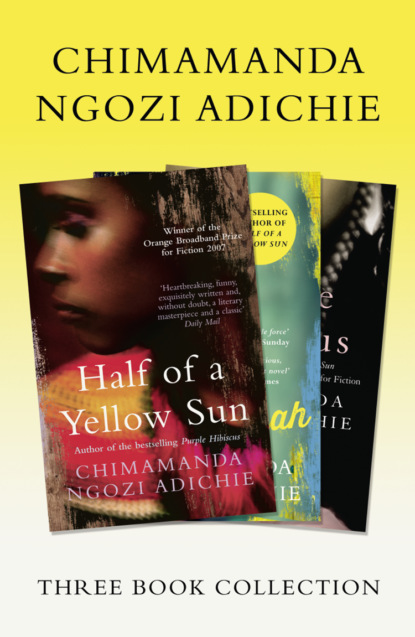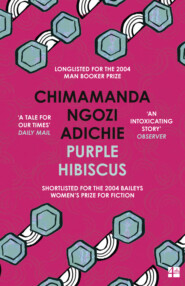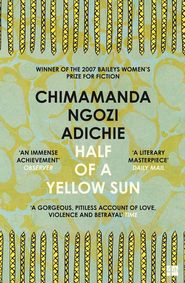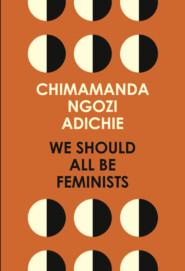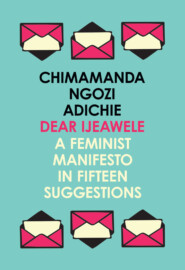По всем вопросам обращайтесь на: info@litportal.ru
(©) 2003-2024.
✖
Half of a Yellow Sun, Americanah, Purple Hibiscus: Chimamanda Ngozi Adichie Three-Book Collection
Автор
Год написания книги
2018
Настройки чтения
Размер шрифта
Высота строк
Поля
‘I once spat in my father’s glass of water,’ she said. ‘He hadn’t upset me or anything. I just did it. I was fourteen. I would have been incredibly satisfied if he drank it, but of course Olanna ran and changed the water.’ She stretched out beside him. ‘Now you tell me something horrible you did.’
He was aroused by her silky skin rubbing against his, by how readily she had changed the evening plans with Major Madu. ‘I didn’t have the confidence to do horrible things,’ he said.
‘Well, tell me something, then.’
He thought of telling her about that day in Wentnor when he hid from Molly and felt, for the first time, the possibility of shaping his own destiny. But he didn’t. Instead, he told her about his parents, how they stared at each other when they talked, forgot his birthdays, and then had Molly make a cake that said happy belated birthday weeks after. They never knew what and when he ate; Molly fed him when she remembered. They had not planned to have him and, because of that, they had raised him as an afterthought. But he understood even as a young boy that it was not that they did not love him, rather it was that they often forgot that they did because they loved each other too much. Kainene raised her eyebrows, sardonic, as if his reasoning did not make sense to her, and because of that he was afraid to tell her that he sometimes thought he loved her too much.
2. The Book: The World Was Silent When We Died
He discusses the British soldier-merchant Taubman Goldie, how he coerced, cajoled, and killed to gain control of the palm-oil trade and how, at the Berlin Conference of 1884 where Europeans divided Africa, he ensured that Britain beat France to two protectorates around the River Niger: the North and the South.
The British preferred the North. The heat there was pleasantly dry; the Hausa-Fulani were narrow-featured and therefore superior to the negroid Southerners, Muslim and therefore as civilized as one could get for natives, feudal and therefore perfect for indirect rule. Equable emirs collected taxes for the British, and the British, in return, kept the Christian missionaries away.
The humid South, on the other hand, was full of mosquitoes and animists and disparate tribes. The Yoruba were the largest in the Southwest. In the Southeast, the Igbo lived in small republican communities. They were non-docile and worryingly ambitious. Since they did not have the good sense to have kings, the British created ‘warrant chiefs’, because indirect rule cost the Crown less. Missionaries were allowed in to tame the pagans, and the Christianity and education they brought flourished. In 1914, the governor-general joined the North and the South, and his wife picked a name. Nigeria was born.
PART TWO (#u3c1576f1-c916-57b7-bb43-a63c028a7109)
The Late Sixties (#u3c1576f1-c916-57b7-bb43-a63c028a7109)
7 (#u3c1576f1-c916-57b7-bb43-a63c028a7109)
Ugwu lay on a mat in his mother’s hut, staring at a dead spider squashed on the wall; its body fluids had stained the mud a deeper red. Anulika was measuring out cups of ukwa and the crusty aroma of roasted breadfruit seeds hung thick in the room. She was talking. She had been talking for quite a while, and Ugwu’s head ached. His visit home suddenly seemed much longer than a week, perhaps because of the endless gassy churning in his stomach from eating only fruit and nuts. His mother’s food was unpalatable. The vegetables were overcooked, the cornmeal was too lumpy, the soup too watery, and the yam slices coarse from being boiled without a dollop of butter. He could not wait to get back to Nsukka and finally eat a real meal.
‘I want to have a baby boy first, because it will place my feet firmly in Onyeka’s house,’ Anulika said. She walked over to get a bag in the rafters and Ugwu noticed, again, the new suspicious roundness to her body: the breasts that filled her blouse, the buttocks that rolled with each step. Onyeka must have touched her. Ugwu could not bear to think of the man’s ugly body thrusting into his sister’s. It had all happened too fast; there had been talk of suitors the last time he visited, but she had spoken of Onyeka in such an indifferent way that he did not think she would accept his proposal so quickly. Now even their parents were too swift to talk about Onyeka, his good mechanic job in town, his bicycle, his good behaviour, as if he were already a member of the family. Nobody ever mentioned his stunted height and the pointed teeth that looked like they belonged to a bush rat.
‘You know, Onunna from Ezeugwu’s compound had a baby girl first, and her husband’s people went to see a dibia to find out why! Of course, Onyeka’s people will not do that to me, they don’t dare, but I want to have a boy first anyway,’ Anulika said.
Ugwu sat up. ‘I have tired of stories of Onyeka. I noticed something when he came by yesterday. He should bathe more often, he smells like rotten oil beans.’
‘And you, what do you smell like?’ Anulika poured the ukwa in the bag and knotted it. ‘I’ve finished. You better get going before it gets too late.’
Ugwu went out to the yard. His mother was pounding something in a mortar and his father was stooped near her, sharpening a knife against a stone. The scrape of metal against stone set off tiny sparks that flickered briefly before they disappeared.
‘Did Anulika wrap the ukwa well?’ his mother asked.
‘She did.’ Ugwu raised the bag to show her.
‘Greet your master and madam,’ his mother said. ‘Thank them for everything they sent us.’
‘Yes, Mother.’ He went over and hugged her. ‘Stay well. Greet Chioke when she returns.’
His father straightened up and wiped the knife blade on his palm before shaking hands. ‘Go well, ije oma. We will send word when Onyeka’s people tell us they are ready to bring palm wine. It will be in a few months’ time.’
‘Yes, Father.’ Ugwu stood around while his little cousins and siblings, the younger ones naked and the older ones in oversized shirts, said their goodbyes and listed what they wanted him to bring on his next visit. Buy us bread! Buy us meat! Buy us fried fish! Buy us groundnuts!
Anulika escorted him to the main road. He saw a familiar figure near the grove of ube trees and, although he had not seen her since she went to Kano to learn a trade four years ago, he knew immediately that it was Nnesinachi.
‘Anulika! Ugwu! Is it you?’ Nnesinachi’s voice was as husky as he remembered but she was taller now, and her skin was darker from the fierce sun in the North.
When they hugged, he felt her chest push into his.
‘I would barely have recognized you, the North has changed you so,’ he said, wondering if she had really pressed herself against him.
‘I came back yesterday with my cousins.’ She was smiling at him. She had never smiled at him so warmly in the past. Her eyebrows had been shaved and pencilled in, one thicker than the other. She turned to Anulika. ‘Anuli, I was on my way to see you. I hear you are getting married!’
‘My sister, it is what I hear too,’ Anulika said, and they both laughed.
‘Are you going back to Nsukka?’ she asked Ugwu.
‘Yes. But I will come back soon, for Anulika’s wine-carrying.’
‘Go well.’ Nnesinachi’s eyes met his briefly, boldly, before she walked on, and he knew he had not imagined it; she really had pressed herself against him when they hugged. He felt a rush of weakness to his legs. He held himself from turning back to look at her, just in case she turned as well, and for a moment, he forgot the uncomfortable churning in his stomach.
‘Her eyes must have opened in the North. You can’t marry her, so you had better take what she is offering, before she marries,’ Anulika said.
‘You noticed?’
‘How could I not have noticed? Do I look like a sheep?’
Ugwu narrowed his eyes to look at her. ‘Has Onyeka touched you?’
‘Of course Onyeka has touched me.’
Ugwu slowed his pace. He knew she must have slept with Onyeka and yet he did not like her confirming it. When Chinyere, Dr Okeke’s housegirl, first started to sneak across the hedge to his Boys’ Quarters for hasty thrusts in the dark, he had told Anulika about it during a visit home and they had discussed it. But they had never discussed her; he had always made himself assume that there was nothing to discuss. Anulika was walking ahead of him, unbothered by his sulky slowness, and he hurried up to her, silent, their steps light on the grass where they, as children, had hunted grasshoppers.
‘I’m so hungry,’ he said, finally.
‘You didn’t even eat the yam Mama boiled.’
‘We boil our yam with butter.’
‘We boil our yam with boh-tah. Look at your mouth. When they send you back to the village, what will you do? Where will you find boh-tah to use to boil your yam?’
‘They won’t send me back to the village.’
She looked at him from the corners of her eyes, up and down. ‘You have forgotten where you come from, and now you have become so foolish you think you are a Big Man.’
Master was in the living room when Ugwu came in and greeted him.
‘How are your people?’ Master asked.
‘They are well, sah. They send greetings.’
‘Very good.’
‘My sister Anulika will be getting married soon.’
‘I see.’ Master was focused on tuning the radio.





